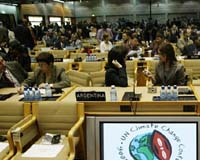| . |  |
. |
Bonn, Germany (UPI) May 18, 2010 Christiana Figueres of Costa Rica is the new U.N. climate protection chief. Appointed Monday by U.N. Secretary-General Ban Ki-moon, Figueres is to succeed Yvo de Boer as the head of the U.N. Framework Convention on Climate Change when the Dutchman steps down July 1. Figueres, 53, knows the climate circus well: She has been a negotiator for her country since 1995, has helped draft climate protection strategies all over Latin America, and has represented Latin America and the Caribbean in international negotiations. Ban said Figueres brings to the position "a passion for the issue, deep knowledge of the stakeholders and valuable hands-on experience with the public sector, non-profit sector and private sector." She will certainly need some skills to revive climate negotiations, which have been deadlocked since the previous U.N. summit in Copenhagen ended in acrimony. Leaders couldn't agree on concrete emissions reduction targets or a way to measure them. They also failed to come up with a system of funding from rich to poor nations to help them cope with climate change. The summit culminated in the publication of the so-called Copenhagen Accord, a weak declaration agreed between the United States, China, Brazil and South Africa after larger negotiations had broken down. The accord wasn't adopted but merely noted by countries, many of which denounced it. Poorer countries felt that the talks were being dominated by a few large industrialized nations. Figueres in a statement acknowledged those differences, stating that her immediate priorities are to strengthen trust in the process and to support the Mexican presidency as well as all other Parties in the preparation to ensure a successful summit in Cancun, Mexico, where more than 190 nations are to convene for another major round of negotiations toward the end of the year. Industrialized and developing nations are still at odds over how to limit the global temperature rise to no more than 3.6 degrees Fahrenheit. A rise beyond that limit would result in potentially catastrophic consequences for humanity, with meteorological disasters increasing, scientists say. Indian, Chinese and European officials during the past weeks said hopes for a comprehensive climate treaty to emerge from Cancun are virtually zero. Developing nations have resisted a legally binding treaty because they feel rich nations that have benefited from emitting during the past decades should shoulder more of the burden. Industrialized countries argue the developing nations need to commit to concrete reduction targets to enable a global effort. Figueres said the negotiations would change in style. "Way too many roads and not enough bridges have been built," she was quoted as saying by the Environmental News Service. "Trust-building is a process over time. It is a very difficult path, but I am convinced that it is the path that we need to follow, that we need to embark on immediately. It is the only path that will lead us to creativity, innovation and any sort of agreement in Cancun and beyond." China recently overtook the United States as the world's biggest emitter of heat-trapping greenhouse gases but still emits far less on a per capita basis.
Share This Article With Planet Earth
Related Links Climate Science News - Modeling, Mitigation Adaptation
 Costa Rican named UN climate chief
Costa Rican named UN climate chiefUnited Nations (AFP) May 17, 2010 UN Secretary General Ban Ki-moon has named Costa Rica's Christiana Figueres to be the organization's top official on climate change, his spokesman announced Monday. UN spokesman Martin Nesirky said the 53-year-old Costa Rican, currently San Jose's climate change negotiator, would succeed Yvo de Boer of the Netherlands as the executive secretary of the United Nations Framework Convention on C ... read more |
|
| The content herein, unless otherwise known to be public domain, are Copyright 1995-2010 - SpaceDaily. AFP and UPI Wire Stories are copyright Agence France-Presse and United Press International. ESA Portal Reports are copyright European Space Agency. All NASA sourced material is public domain. Additional copyrights may apply in whole or part to other bona fide parties. Advertising does not imply endorsement,agreement or approval of any opinions, statements or information provided by SpaceDaily on any Web page published or hosted by SpaceDaily. Privacy Statement |